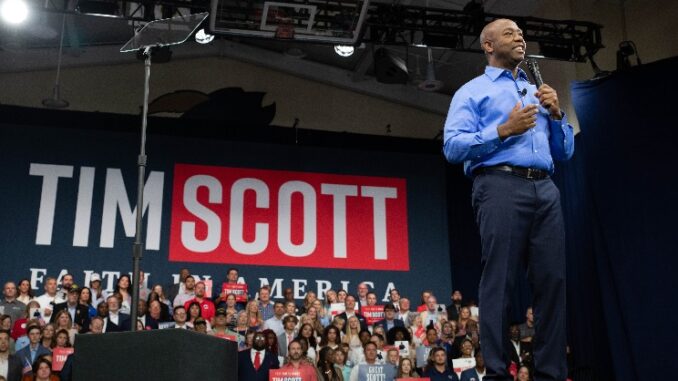
I will proudly admit that Ronald Reagan is my political hero and, in my humble opinion, the greatest president in my abbreviated lifetime. For the record, Dwight Eisenhower comes in a distant second – I was born at the tail end of his second term – and the rest of the pack trails badly. And so, I think it behooves the Republican Party to examine what made “the Gipper” so great, so popular, and so electable (and re-electable).
Here, for what it’s worth, is my “expert” analysis…
First, Ronald Reagan knew who he was and what he believed. You wouldn’t think those qualities would be so unique, but these days they are rarer than the Dodo or the Passenger Pigeon, both of which are long extinct. From the time he championed Barry Goldwater’s candidacy in 1964 with his “A Time for Choosing” keynote address to his last day in office on January 20, 1989, Reagan never wavered in his core convictions. Even people who didn’t agree with his policies found such trueness to oneself refreshing.
Second, Ronald Reagan was called the “Great Communicator” for good reason. Whether he was demanding “Mr. Gorbachev, tear down this wall” or referring to the Soviet Union as an “Evil Empire,” Reagan was a master of the spoken word. Historians and officeholders alike will study his “The Boys of Pointe du Hoc” speech, delivered in Normandy on the 40th anniversary of D-Day, for generations to come. Likewise, Reagan’s address to the country following the Challenger disaster was equal parts healing and mesmerizing. He spoke directly from his heart and hit all the right notes in a speech for the ages.
Third, Ronald Reagan was intentionally funny. When he said that the nine scariest words in the English language are “I’m from the government and I’m here to help,” we all nodded our heads in agreement and laughed along with him… even if we’d heard the joke many times before. Sometimes, his humor also revealed an inner strength and a deep personal faith, such as when he told Nancy after he was shot, “I forgot to duck” or when he asked the doctors who were about to operate on him if they were all Republicans.
The twinkling eye, the slight tilt of the head, and an Irishman’s love for storytelling were all part of Reagan’s innate and very potent political arsenal.
Fourth, there was very little pretense to Ronald Reagan. He wore his patriotism – and his love for Nancy – on his sleeve for all the world to see. Even his infrequent, but righteous anger demonstrated the genuineness of his personality. One of my favorite Reagan moments occurred in 1980, shortly before the New Hampshire primary, when a debate moderator sought to cut him off. Visibly angered, Reagan rose to his feet before sitting back down and shouting, “I’m paying for this microphone!” The audience – and even his challengers – cheered loudly… and the GOP nomination was his.
In the same manner, Reagan used his quick wit as both an offensive and a defensive weapon during the second presidential debate in 1984 after he had faltered in the first, raising questions about his age. Referring to Walter Mondale, his Democratic opponent, Mr. Reagan quipped, “I want you to know that also I will not make age an issue of this campaign. I am not going to exploit, for political purposes, my opponent’s youth and inexperience.” The 56-year-old Mondale smiled wanly as the audience erupted in laughter, signally a virtual end to the campaign.
Fifth, Ronald Wilson Reagan was an eternal optimist. “It’s morning in America” wasn’t just a campaign slogan; it was a deeply held personal belief. We wanted to believe that our country’s best days were yet to come and so, we hitched our wagon to the Pied Piper of conservatism as he channeled John Winthrop and described the United States as a “city on a hill.”
So, what does this have to do with Sen. Tim Scott of South Carolina? Simply put, he – more than any politician since Jack Kemp – reminds me of the Gipper. Sen. Scott knows who he is and what he believes, often referencing his deep Christian faith. And although he didn’t grow up in a small town in Illinois where, as a lifeguard, Reagan rescued dozens of swimmers, Sen. Scott has an extremely compelling personal story. Raised in poverty by a single mother, Scott often uses the phrase, “from cotton to Congress,” to describe his family’s journey in just two generations.
Like Reagan, Scott is also contagiously optimistic, a rare commodity in the GOP (Grumpy Old Party). People, especially independents and those who don’t live and die with the goings-on inside the Washington Beltway, are drawn to his upbeat personality. Tellingly, Scott’s stump speeches are often laced with words like “opportunity” and “possibilities.” I have a feeling that message will sell well in Iowa, New Hampshire, and yes, South Carolina.
I have a lot of respect for former Rep. Trey Gowdy, a strong conservative who served alongside Scott in the House before Scott was appointed to the Senate by then-Gov. Nikki Haley. Trey is a big fan of Scott’s… and I am becoming more so by the day.
Let me leave you with a few Tim Scott quotes…
“America is not a racist country.”
“Only in America can my story play out the way it has.”
“I could think my way out of poverty.”
“People change their minds. They embrace truth.”
“I’m not sure I ever would have found Jesus if my ego took me where I wanted to go… In college, Jesus became everything to me… My life is worthless without Jesus Christ.”


